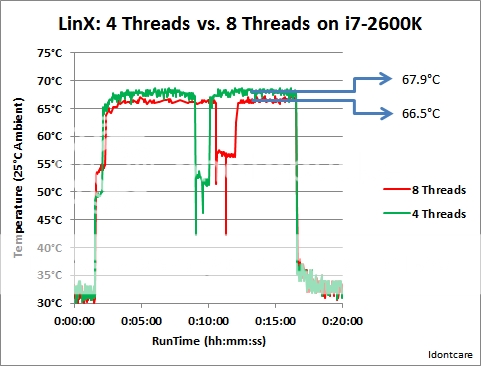Hi!
I'm researching whether I should get an i5 or i7 CPU for my next gaming machine. The consensus seems to be that hyperthreading makes very little difference, except for situations where CPU calculations are very intense (massive online multiplayer games like Battlefield 3 and maybe strategy games that support HT).
I can afford to buy the i7, but I'd rather have a cooler machine. Right now, I'm pretty set on getting a high-end iMac, where you can't turn off hyperthreading or overclock (no bios).
So, I have two questions:
AFAIK hyperthreading makes the CPU noticably hotter. Is this only when the CPU is overclocked, or is there also a clear difference in temperature with an i7 at stock speeds (no overclocking) when gaming? (The iMac typically runs very hot when gaming, so less heat is a good thing.)
This stutter issue many are talking about (in Battlefield 3, but also several other games). Is the stuttering issue also present with hyperthreading CPUs at stock speeds, or is it a problem only with overclocking (and added stress to the CPU)?
I would greatly appreciate some advice, if anyone here has any knowledge of these issues. Thanks for reading.
I'm researching whether I should get an i5 or i7 CPU for my next gaming machine. The consensus seems to be that hyperthreading makes very little difference, except for situations where CPU calculations are very intense (massive online multiplayer games like Battlefield 3 and maybe strategy games that support HT).
I can afford to buy the i7, but I'd rather have a cooler machine. Right now, I'm pretty set on getting a high-end iMac, where you can't turn off hyperthreading or overclock (no bios).
So, I have two questions:
AFAIK hyperthreading makes the CPU noticably hotter. Is this only when the CPU is overclocked, or is there also a clear difference in temperature with an i7 at stock speeds (no overclocking) when gaming? (The iMac typically runs very hot when gaming, so less heat is a good thing.)
This stutter issue many are talking about (in Battlefield 3, but also several other games). Is the stuttering issue also present with hyperthreading CPUs at stock speeds, or is it a problem only with overclocking (and added stress to the CPU)?
I would greatly appreciate some advice, if anyone here has any knowledge of these issues. Thanks for reading.
Last edited:



